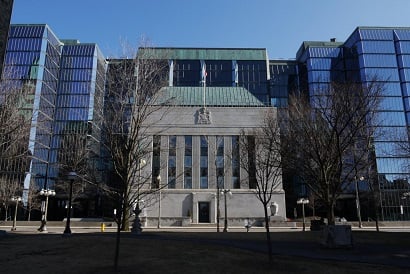Although the BoC’s decision to hike rates today comes as no surprise, the move does mark a sea change in attitude

Although the Bank of Canada’s decision to hike rates to 0.75% from 0.5% today comes as no surprise, the move does mark a sea change in attitude from the central bank. When Deputy Governor Carolyn Wilkins spoke about how well Canada’s economy was recovering in early June, the expectations for a rate hike were, based on overnight index swaps data compiled by Bloomberg, at 5%.
Generally, when such hawkish comments come out of a central bank, investors expect an imminent follow up speech that realigns the bank’s stance and corrects the market reaction. But, that was not the case in this scenario. Wilkins’ speech was followed up by equally hawkish comments from the bank’s governor Stephen Poloz and by the time Finance Minister Bill Morneau said the Canadian economy “is really firing on all cylinders" this Monday, the expectations for a rate hike were at 91%.
“A month ago Mr. Poloz gave a speech in which he said the need for the emergency rate cut, which was made a couple of years ago, was no longer required because the economy had adjusted to the low oil prices,” says Brian D’Costa of Algonquin Capital. “Up until that point, the market didn’t think the Bank of Canada would hike until 2018.”
D’Costa believes Stephen Poloz and the BoC will make one more hike by Christmas and then take a pause in 2018. He sees the current trend of rising rates as a “global phenomenon”.
“After the financial crisis, all of the central banks were very concerned with deflation risk and took rates really low, the ECB even went negative.” D’Costa says. “Now, central banks are not as concerned with deflation and they are taking back that emergency stimulus because they think the risk is diminished. I don’t think we’re seeing hiking because of inflation fear, it’s simply because central banks do not see deflation as a problem on the horizon.”
Both investors and consumers will be keeping a close eye on what the Bank of Canada does in 2018 (if we presume another rate hike before Christmas is inevitable). RBC released a study in early June which showed that, if interest rates in Canada go up by 100 basis points, consumers would be required to allocate an extra two cents out of every dollar towards servicing debt.
“I think the impact on the consumer can be significant and that’s why the Bank of Canada will move fairly slowly and will likely pause after two hikes,” D’Costa says. “However, rate hikes are good for some parts of the economy and it will help banks and insurance companies boost earnings.”
Related stories:
Bank of Canada makes interest rate announcement
Will Stephen Poloz change interest rates today?



